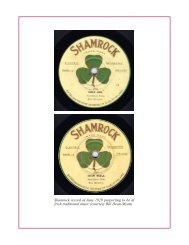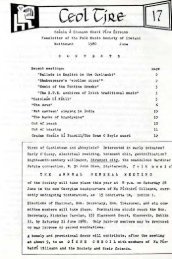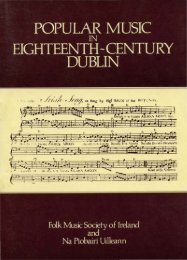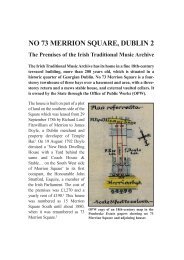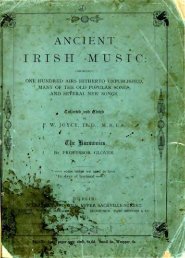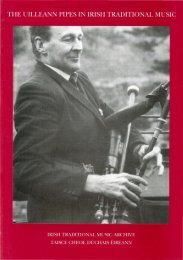Union Pipes - Irish Traditional Music Archive
Union Pipes - Irish Traditional Music Archive
Union Pipes - Irish Traditional Music Archive
Create successful ePaper yourself
Turn your PDF publications into a flip-book with our unique Google optimized e-Paper software.
81 COURTNEY’S ‘UNION PIPES’ AND THE TERMINOLOGY OF IRISH BELLOWS-BLOWN BAGPIPES<br />
common terms. 293 At its foundation in February 1900 the printed<br />
objectives of the Club included the ‘popularisation of the various<br />
forms of <strong>Irish</strong> pipes... both the <strong>Union</strong> <strong>Pipes</strong> and the Píob Mór [sic] or<br />
old <strong>Irish</strong> War <strong>Pipes</strong>’, 294 and as if in response a Dublin dealer in old<br />
musical instruments, in April of that year, placed an advertisement<br />
for the sale of ‘<strong>Irish</strong> Bagpipes (union) by Colgan, Coyne, Kenna,<br />
etc.’. 295 Following the understanding of the older pipers that the term<br />
referred to a concord of sounds or a union of pipes, the Club<br />
continued to call the instrument ‘union pipes’ after Flood’s lecture,<br />
and this remained its standard term. It was used until the Club came<br />
to an end more than a decade afterwards, by it and by its pipes<br />
teachers Nicholas Markey and William N. Andrews, and generally in<br />
newspaper reports of its activities at Gaelic League feiseanna and<br />
oireachtaisí. In a review of Flood’s 1911 volume The Story of the<br />
Bagpipe, 296 the Club’s scholarly piping historian Séamus Ó Casaide<br />
challenges his derivation of ‘union’ from ‘uilleann’ as ‘a doubtful<br />
etymology’. 297 ‘<strong>Union</strong> pipes’ was the term used in a lecture in 1912<br />
by Éamonn Ceannt, a leading member of the Club who would be<br />
executed for his part in the Easter Rebellion of 1916, 298 and in the<br />
same year its Secretary Micheál Ó Duibhginn was using the term in<br />
writing to the press about the forthcoming Oireachtas ‘<strong>Union</strong> pipes<br />
competition’. 299 It is as late as January 1913 before Cumann na<br />
bPíobairí is first found to use ‘Píobaí Uilleann’ in a festival<br />
programme, and then it is only as the <strong>Irish</strong>-language equivalent of<br />
‘<strong>Union</strong> <strong>Pipes</strong>’. 300 In its festival programme of 1914, shortly before it<br />
came to an end, the Club follows the same practice, but also uses the<br />
293<br />
Ibid.<br />
294<br />
Reproduced in An Píobaire vol. 3, no 37 (Sept. 1998): 20–2.<br />
295<br />
Freeman’s Journal, Dublin, 30 Apr. 1900.<br />
296<br />
Flood 1911.<br />
297<br />
Ó Casaide 1912: 110–.2<br />
298<br />
Claidheamh Soluis, Dublin, 29 July 1911.<br />
299<br />
Claidheamh Soluis, Dublin, 25 May 1912.<br />
300<br />
Programme of Cumann na bPíobairí Pipers’ Festival, 10 Jan. 1913.



